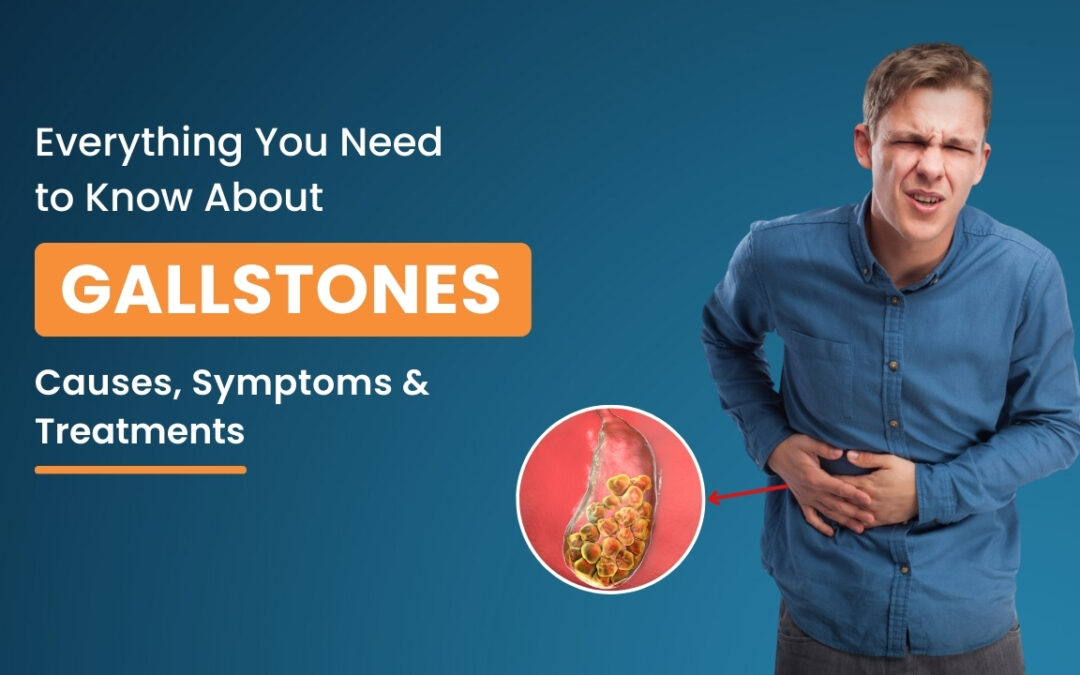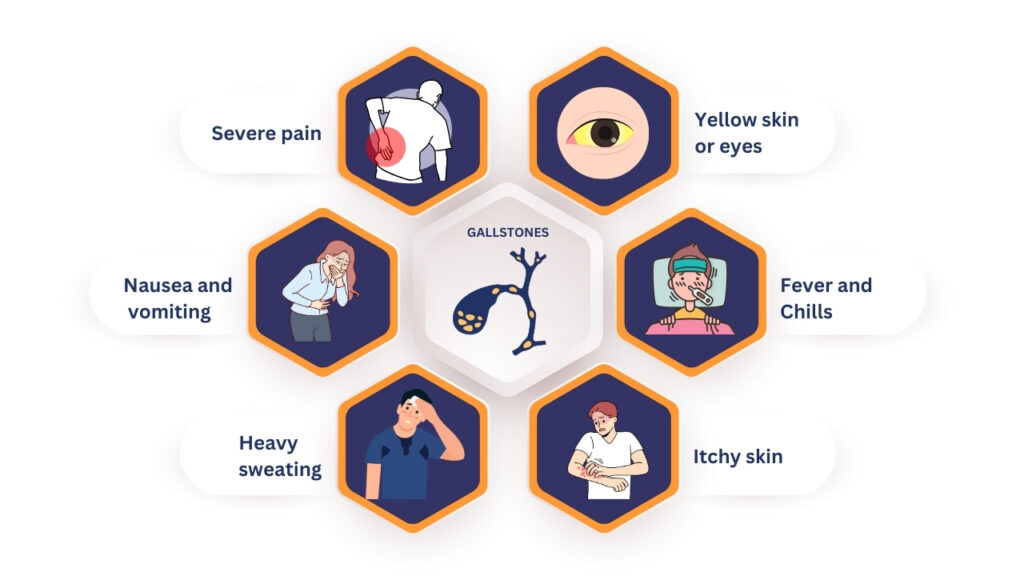Everything You Need to Know About Gallstones: Causes, Symptoms, and Treatments
Introduction to Gallstones
Gallstones are solid particles that form in the gallbladder. The gallbladder is a small organ located below the liver responsible for storing bile produced by the liver. Most causes can be managed naturally; however, gallstones can block the bile ducts and cause sudden pain in the upper right abdomen, known as a gallbladder attack or biliary colic. If not taken seriously, gallstones can lead to serious complications affecting the pancreas or liver and sometimes cause severe pain. In the most serious cases not treatable by normal medications, patients are usually treated with surgery or other operations.
Definition and Anatomy of Gallstones
Gallstones are hardened deposits that can form in the gallbladder or bile ducts. They can be composed of either cholesterol or pigment, with varying implications for treatment and management.
Types of Gallstones: Cholesterol vs. Pigment Stones
Cholesterol stones are the most common type of gallstone. Their formation depends on our lifestyle and diet. Consuming high-fat food can create an imbalance in cholesterol, forming stones when there is an imbalance of cholesterol and bile salts in the bile. Pigment stones, on the other hand, are caused by excess bilirubin in the bile.
Cholesterol Gallstone Formation
Cholesterol plays a crucial role in the development of cholesterol gallstones. When there is an excess of cholesterol in the bile, it can solidify into stones over time.
Pigment Gallstone Formation
Pigment stones are often associated with conditions that cause excessive breakdown of red blood cells, leading to elevated levels of bilirubin in the bile.
Common Symptoms of Gallstones in the Gallbladder
Gallstones are hard formations that can form in the gallbladder or bile duct. Common symptoms include:
-
Pain in the back between the shoulder blades
-
Pain in the right shoulder
-
Nausea
-
Vomiting
-
Fever
-
Chills
-
Jaundice (a yellowing of the skin or eyes)
Complications of Gallstones: When to Seek Medical Attention
You should seek immediate medical attention for gallstone complications if you experience any of the following symptoms. Otherwise, you may face more severe consequences, sometimes leading to gallbladder surgery or operation. It is better to consult a gastroenterologist.
Abdominal pain
Pain that lasts longer than a few hours, is severe or prevents you from finding a comfortable position.
Jaundice
Yellowing of your skin or the whites of your eyes.
Fever and chills
A high fever, even if it’s low-grade.
Other symptoms that may indicate a gallstone complication include: [h3]
- Nausea and vomiting
- Tea-colored urine
- Light-colored stools
- Confusion
- Loss of appetite
These are the complications you may face if you don’t address gallbladder pain.
Genetic and Lifestyle Factors Influencing Gallstone Development
Gallstones are prevalent, affecting millions of individuals worldwide. Certain risk factors, such as obesity, rapid weight loss, genetics, and certain medical conditions, can increase the likelihood of developing gallstones. Genetic predisposition, as well as lifestyle factors such as a diet high in fat and low in fiber, a sedentary lifestyle, and rapid weight loss, can contribute to the formation of gallstones.
Treatment Options for Gallstones in the Gallbladder
Treatment for gallstones depends on their size and composition in the gallbladder, as well as the symptoms they cause. Sometimes basic medication can cure the issue; however, it can become serious.
Non-invasive Treatment Approaches: Medications and Lifestyle Changes
For individuals with small, asymptomatic gallstones, medications to dissolve the stones or lifestyle modifications to prevent their growth may be recommended.
Minimally Invasive Procedures for Gallstone Removal
Minimally invasive procedures, such as endoscopic retrograde cholangiopancreatography (ERCP) or laparoscopic cholecystectomy, are often used to remove gallstones or the gallbladder itself.
Surgical Options for Gallstone Management
In cases of recurrent gallstones or complications, surgical removal of the gallbladder (cholecystectomy) may be necessary to prevent further issues.
Living with Gallstones: Diet and Prevention Strategies
Managing gallstones involves dietary modifications and lifestyle changes to reduce the risk of stone formation.
Dietary Recommendations for Managing Gallstones
A diet low in fat and cholesterol, high in fiber, and rich in fruits and vegetables can help prevent the formation of gallstones and alleviate symptoms.
Lifestyle Changes to Reduce the Risk of Gallstone Formation
Maintaining a healthy weight, staying physically active, and avoiding rapid weight loss can reduce the risk of developing gallstones.
Long-term Management and Monitoring of Gallstones
Regular check-ups with healthcare providers are essential for monitoring gallstones and addressing any changes in symptoms or complications. It is better to consult a gastroenterologist.
Conclusion
Understanding gallstones is essential for effectively managing this common medical condition. By recognizing the causes, symptoms, and treatment options for gallstones, individuals can take proactive steps to improve their quality of life. If you experience any of the symptoms discussed, it is recommended to consult a gastroenterologist. This can help reduce the risk of gallbladder surgery or other operations.
FAQs
1. Can gallstones be prevented through diet and lifestyle changes?
Mostly in the early stages, the problem can be reduced with diet. However, it is better to consult a gastroenterologist who may help you with medications.
2. What are the main symptoms of gallstones?
- Abdominal pain
- Jaundice
- Fever and chills
- Light-colored stools
- Confusion
- Loss of appetite
3. Are there any natural remedies for gallstones?
There are no particularly safe natural remedies for gallstones. In the early stage, diet control may help, but it is better to consult a gastroenterologist.



